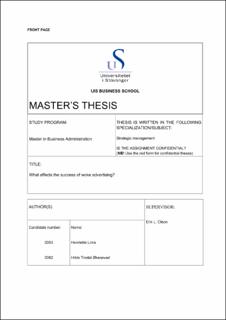| dc.contributor.advisor | Olson, Erik L. | |
| dc.contributor.author | Lima, Henriette | |
| dc.contributor.author | Øksnevad, Hilde | |
| dc.date.accessioned | 2020-09-23T09:11:54Z | |
| dc.date.available | 2020-09-23T09:11:54Z | |
| dc.date.issued | 2020-08 | |
| dc.identifier.uri | https://hdl.handle.net/11250/2679191 | |
| dc.description | Master's thesis in Strategy and management | en_US |
| dc.description.abstract | Purpose – Woke advertising is a young concept with limited research regarding the subject. As woke advertising is becoming increasingly popular in the marketing field and has shown to be able to either greatly benefit or damage brands, this study aims to contribute to current research by studying what affects the success of woke advertising by analyzing consumer reactions to two different woke commercials. Design/methodology/approach – Content analysis categorizes and compares YouTube comments for an Always commercial published in 2014 and an Audi commercial published in 2017, both promoting gender equality. Findings – From the results of the comment categorization we found that the most frequent positive comments for both commercials support the cause the brand is promoting, while the most common negative comments for both commercials are disagreeing with the message/facts of the ad. In general, the comments are more concerned with the message of the commercial than the relationship the ad has to the brand. Always is seen as more appropriate in its marketing than Audi, while Audi is seen as more authentic than Always. Research limitations/implications – Research is limited as only two commercials using woke advertising are analyzed and only by using the feedback found on YouTube. Usually people with strong opinions leave more comments, hence our results may reflect extremities. Still, the findings in positive/negative comments may be representative of the majority of people's views considering the consistency with the dislike/like ratio on the videos. Originality/value – This study expands the understanding of advertising using social and political issues by addressing the factors affecting the success of woke advertising. It emphasizes the relationship between femvertising and consumer responses, which can contribute to better knowledge in the gender equality aspect of woke advertising. | en_US |
| dc.language.iso | eng | en_US |
| dc.publisher | University of Stavanger, Norway | en_US |
| dc.relation.ispartofseries | Masteroppgave/UIS-HH/2020; | |
| dc.rights | Navngivelse 4.0 Internasjonal | * |
| dc.rights.uri | http://creativecommons.org/licenses/by/4.0/deed.no | * |
| dc.subject | økonomi | en_US |
| dc.subject | administrasjon | en_US |
| dc.subject | strategi og ledelse | en_US |
| dc.subject | reklame | en_US |
| dc.title | What affects the success of woke advertising? | en_US |
| dc.type | Master thesis | en_US |
| dc.subject.nsi | VDP::Social science: 200::Economics: 210::Business: 213 | en_US |

